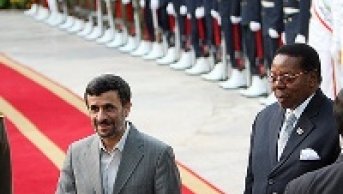US Double-standard: Current Syria Policy vs. Iraq Invasion

Let us remember, when the US invaded Iraq in 2003, it tried to make the invasion look legitimate by putting forward some arguments.
What were those arguments the US put forward at the time? 1) Iraq, led by Saddam Hussein, supports terrorism. 2) Iraq, led by Saddam, has weapons of mass destruction (WMDs). 3) We will save the Iraqi people from the tyranny of Saddam, and we will bring democracy that will set an example in the Middle East.
So, what happened? The US wanted to legitimize and justify the invasion and attract supporters through the aforementioned arguments. However, it not only failed to even convince some of its allies, but this situation also caused a tremendous reaction against the US in world public opinion. Nevertheless, the US, which did not pay any attention to the reactions, invaded Iraq anyway.
The consequences -a total disaster from all aspects. The arguments of the US for legitimizing the invasion turned out to be lies after all.
First of all, it was said that Iraq, led by Saddam, had links with the terrorists who committed the Sept. 11 attacks. Then it was alleged that Iraq provided al-Qaeda members, linked with the Sept. 11 terrorists, with chemical weapons. However, those arguments, strongly alleged by leading US figures before the invasion, could not be proven.
Second, it was asserted, by taking advantage of Saddam’s criminal record (the Iran-Iraq War, the Halabja massacre), that Iraq had WMDs and that it was trying to develop them. Also, it was put forth that Iraq was working on producing long-range “Hellfire” missiles and to use them at will. Although experts stated that Iraq did not have this kind of weapon before the invasion, the US did not seem likely to be convinced and indeed it was not. The US administrators in the post-invasion period had to admit that they could not find any WMDs in Iraq. So this argument was proven to be just propaganda to convince both domestic and foreign public opinion.
Third, it was suggested again, using Saddam’s criminal record as a basis, that he had oppressed people and that the Iraqi people were suffering from this oppression. By putting forward this argument, the US tried to tell Iraq that it was essential to “bring democracy.” Correct, Saddam oppressed the Iraqi people, massacred many, but the US did not bring democracy to post-Saddam Iraq. Still, waiting for “democracy” for the Iraqis is like waiting for the Mahdi.
Now, let us talk about the US’s policy concerning Syria and its president, Bashar al-Assad.
It appears that the US’s Syria policy, which suggests that it has always leaned towards and supported the Arab Spring process since the very beginning, is not yet clear, or the US wants it to seem so. Some two years ago, when the popular uprisings broke out against the Assad regime in Syria, the US made statements showing that it had maintained its stance on Tunisia, Egypt and Libya. In fact, the US even stated that it had provided the opposition forces with technical and intelligence support from time to time. However, it has been seen over the course of time that the US has neither a very clear stance on Syria nor on Assad. How can one explain the fact that the US, which invaded Iraq based on inaccurate arguments, keeps silent on Syria despite the fact that the same arguments also apply to Syria under the Assad regime?
As can be seen, all the arguments put forward for the invasion of Iraq also apply to Syria under the Assad regime. Here, I do not mean that the US should invade Syria or that this would be legitimate. I am just trying to understand/explain the US’s Syria policy. Let’s see: 1) Has Syria, under Assad’s administration, supported terrorism? Yes. It is not just an allegation, as with Iraq, but it is obvious that Syria has supported terrorism, as can be seen in the examples of the Kurdistan Workers’ Party (PKK) and Hezbollah in particular. As a matter of fact, sometimes Syria did not even feel the need to deny its support for terrorist activities. 2) Does Syria have WMDs? Yes, it does. As a matter of fact, even though some figures of the Assad administration have said, during the now two-year-old uprising against Assad, that they would not use them, they have admitted that they have chemical weapons. 3) Does Assad oppress the Syrian people? Yes. Not only does he oppress the people, he has also been massacring the Syrian people by all available means for two years. In this context, the fact that the US, which initiated the invasion to allegedly bring democracy to Iraq in 2003 when there was not even a civil war, now keeps silent about Syria raises eyebrows.
Considering the situation over the past two years, it might easily be suggested that today the US is abstaining on Syria. So, why does the US, which invaded Iraq despite the outcry and the fact that its arguments were unfounded, abstain on Syria?
The answers to these questions are listed as follows: 1) The opposition movement in Syria is not guided or controlled by the US, and it has not been able to achieve this despite some efforts. 2) It has some concerns about the security of Israel. The US is not sure about the attitude of the opposition towards Israel. It seems unlikely that the US would support the opposition if it were sure about the approach of the Syrian opposition towards Israel. 3) Unlike Iraq, there is not enough oil in Syria to profit from.
For these reasons, the US administration has recently been suggesting a political solution between the regime and opposition forces to put an end to the civil war in Syria. However, considering the resulting situation after two years, it seems impossible for the Assad regime and opposition to reach an agreement. It does not seem convincing for the US, which did not listen to anyone over Iraq, to mention a political solution/consensus now. Due to the conflict with its interests, the US wants to reconcile Assad and the opposition.
What is the difference between forcing the Syrian opposition to make peace with the Assad regime and forcing a rape victim to marry her rapist?









